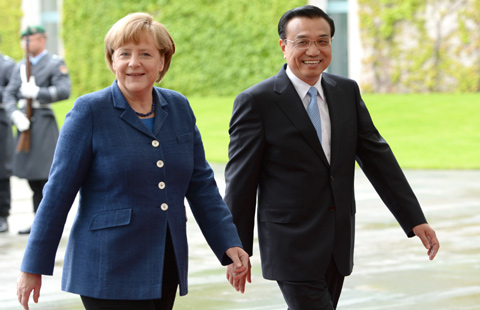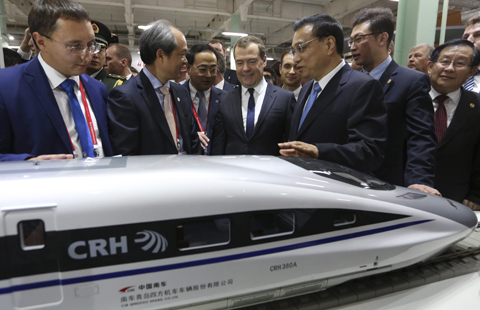Crucial bilateral relationship
Q+A | Rudolf Scharping
As Chinese Premier Li Keqiang prepares to visit Europe in October, Rudolf Scharping, CEO of consultancy firm RSBK GmbH, shares his insights on bilateral relations with China Daily.
How would you evaluate the current relationship?
On the political level, relations between Germany and China are better than ever before. Since the establishment of diplomatic relations there has been continuous development, to which both governments have contributed a lot.
On the economic level, the two countries are both good partners and competitors in some areas.
On the cultural level and regarding the direct exchange of people, there is much progress. But still, I see many further possibilities.
What is the significance of the visit of Premier Li in this context?
There will be very important consultations. China and Germany have signed a strategic partnership.
The visit of Chinese President Xi Jinping to Germany and the visit of German Federal Chancellor Merkel to China have deepened the partnership and further strengthened our relations.
It is important to define 2015 as the year of Sino-German Innovation in most important areas. I am optimistic that we will succeed, because there is a common interest.
In what common interests do the two countries share?
First, there are global challenges - globalization of the economy and the financial markets, as well as the question of stable and affordable supply of food and energy. These challenges require joint responses.
The same applies to climate - protection of nature, access to clean water and similar topics.
You know the rapid development in China since the reforms carried out by Deng Xiaoping have created both success and new challenges.
China is a unique example of a rapid economic success. This means that China has returned to the place it had for centuries, as one of the greatest powers on our planet. But this great success has created new challenges.
We know about that in Germany since the fast reconstruction after the World War II. We also had to learn how to interconnect economic success, protection of natural resources and social stability in order to establish a stable and secure future.
What are the challenges for China in your opinion?
Well, I think that with their experience German companies and institutions can support China in meeting challenges that are decisive for your nation's future.
Among them are improving efficiency in use of energy and raw materials, educating professionals, improving the quality of products, and modernizing the health and welfare system, letting people live a healthy life in clean cities and breathe clean air, producing food in a way that people can rely on its quality and safety, protecting and cleaning waters and not throwing away or incinerating important waste raw materials but reusing them.
Do you also see obstacles?
Still, one obstacle is the unequal competition concerning public contracts and state enterprises. This also relates to the unequal rules for investment, for shareholdings as well as acquisitions of companies.
German companies have invested almost 30 times as much in China as Chinese companies have done in Germany. So there is a lot of room for Chinese investment and they are generally very welcomed.
I know very well from my more than 10 years of business activities in China that the protection of intellectual property, fair cooperation and fair rule of law are of great importance.
I see progress, but there is still a long way to go. The fight against corruption is a strong signal that China wants to go this long way.
People sometimes describe it as power struggle - or even masquerade.
Some people may think like that. However, it is often neglected that a signal without words is of enormous importance in China.
Politics does not succeed without knowledge of cultural and historical context, just as a political leader will not be successful without having economic knowledge.
Is it important for the visit of Premier Li to Germany?
If we only focus on economy and ignore history and culture, then we will destroy our roots as well as the foundation of mutual learning and mutual respect. China, Germany and also Europe need both of them for sustainable economic collaboration.
Premier Li travels to Germany as an experienced politician. He represents a government whose leadership under President Xi is confronted with decisions, which will influence the future of China as never before since the opening-up policy. It is of general interest that these reforms will succeed in China.
|
Rudolf Scharping is a former German federal minister of defense, a former chairman of the Social Democratic Party and now CEO of RSBK GmbH. |
(China Daily 10/10/2014 page7)
Background








